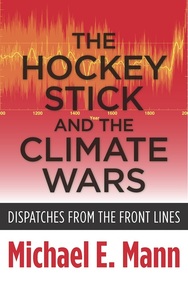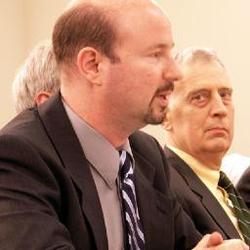 Dagomar Degroot (DD): In your most recent book, The Hockey Stick and the Climate Wars, you chronicle the campaign of misinformation surrounding a widely cited climate reconstruction you published in 1999. Why does the past matter so much for our understanding of present and future climate change? Were you surprised when your reconstruction thrust you into a debate about contemporary policy? Michael Mann (MM): In reality, the “Hockey Stick” (or indeed, the “Hockey Steam” of dozens of reconstructions published over the decade and a half since our original work by other scientists arriving at the same conclusions) has never been the central pillar of evidence for human-caused climate change that the critics make it out to be. There are dozens of independent lines of evidence that human beings are warming the planet and changing the climate through fossil fuel burning and other activities. However, the Hockey Stick demonstrates in a very visual, easily understood way how unprecedented the human-caused warming of the planet is. That made it a threat to vested interests opposed to taking action to curb carbon emissions. And thus did I find myself in the center of the larger campaign to discredit climate change, as I describe in the book. I was surprised at the time that the attacks were so nasty, ad hominem, and factually challenged. Perhaps I should not have been however. I have grown to realize that there is virtually nothing polluting interests won’t stoop to in their efforts to fool the public and policymaker about the threat posed by climate change. DD: In your opinion, is climate change scholarship necessarily political in today’s world? Do climate scholars have a duty to influence policy? MM: Unfortunately, it has become political, because vested interests have sought to divide the public on the issue, recognizing that a divided public is all you need to insure inaction. It wasn’t too long ago that there were politicians on “both sides of the aisle” who recognized the need to act on the climate change threat. In my book, I describe how former Republican House Science Committee Chair Sherwood Boehlert (R-NY) defended climate science and scientists when they were under attack by some of his fellow republicans. In this environment, it is essential that scientists and science communicators fight back against the politically-motivated attacks on their science. I expand on this theme in my op-ed in the New York Times earlier this year, entitled “If you see something, say something." I argue that if scientists do not attempt to inform the public discourse over this vital issue, then we all lose out because this creates a void which will readily be filled by those with an agenda of denial and inaction.  Dr. Michael Mann is one of the world's best-known climate change scholars. He is the director of the Earth System Science Centre at Pennsylvania State University, where he pioneers innovative methods for reconstructing past climate change. He is perhaps best known for a thousand-year climate reconstruction he co-authored in 1999, which featured prominently in both the IPCC's Third Assessment Report (2001) and in Al Gore's An Inconvenient Truth. Mann is the author of more than 160 peer-reviewed publications and two books, and he is the founder of the popular climatology blog RealClimate. On Twitter, he is followed by nearly 23,000 people. For these reasons, we asked Dr. Mann to give an interview that would launch a new "Interviews" section of HistoricalClimatology.com. We are very grateful that he took the time to answer our questions. "We must strive to communicate effectively but honestly, even in the face of an opposition that is unfettered by this latter constraint." DD: Recently, Neil deGrasse Tyson has called for more climate scholars to popularize climate issues as he has popularized astronomy. You are perhaps the world’s most famous climate scientist. How would you respond to Tyson? How can climate scholars connect with a sceptical public? MM: Well, I doubt I’m the world’s most famous scientist, but I appreciate the thought! I naturally agree with deGrasse Tyson (and I’m very much an admirer of his efforts to communicate science to the public), and indeed this was a primary focus of my recent New York Times op-ed. The late Stephen Schneider spoke eloquently of the double ethical bind that we face: we must strive to communicate effectively but honestly, even in the face of an opposition that is unfettered by this latter constraint. We must convey what is known in plainspoken jargon-free language, while acknowledging the real uncertainties that exist. Further, we must explain the implications of those uncertainties, which in many cases imply the possibility of greater, not lesser, risk. Finally, we must not be averse to discussing the policy implications of the science, lest we fail to provide our audience with critical information that can help them make informed choices about their own actions as citizens. DD: Scholars in more and more disciplines are now considering issues related to climate change. As a scientist, what kind of scholarship in “non-scientific” disciplines do you find most interesting? MM: Well, I’m very much a believer in the importance of interdisciplinary research, and climate change is an example of an area of science where interdisciplinary approaches are critical. Obviously, there is physics, chemistry, and math involved--and also biology, since life plays an active role in the climate system (e.g. the carbon cycle). But because climate change impacts so many aspects of life, i.e. human health, water resources, food, land, national security and conflict, and our economy, it is also critical that we interact with scientists in the social sciences, i.e. economics, sociology, political science, and psychology. Beyond this, however, are the ethical dimensions of the problem, i.e. how to balance the interests of the developed world and the developing world, how to balance the costs today with the costs that will be born by future generations. So disciplines of the humanities such as ethics, are critical. And of course, in communicating the science and its implications to the public, we must work with experts in communication and the arts. In my own efforts, both research and outreach, I find myself interacting with individuals in literally every one of the fields and disciplines mentioned above. "There has been a temporary slowdown in warming . . . . The slowdown is almost certainly fleeting." DD: Is there a “pause” in global warming? What does the controversy about a pause reveal both about climate science and its “sceptics?”
MM: There has been a temporary slowdown in warming, what I refer to as a “faux pause” in my Scientific American article earlier this year. The slowdown is almost certainly fleeting, due to a number of natural factors (La Niña, downturn in solar output, and an increase in volcanic activity) that have temporarily masked some of the warming that otherwise would have taken place. This is likely coming to an end. 2014 is on track to be the warmest year on record. However, with climate change deniers, this has never been about the science. They’ll typically grab onto any misleading talking point or myth that they think they can invoke to manufacture doubt about human-caused climate change. So we can expect that when 2014 sets a new global temperature record, they’ll move on to other misleading talking points. DD: Finally: what are you currently working on? MM: Lots of different things. I am working on a number of different projects that deal with climate change impacts on human health, and water resources, efforts to isolate the true impacts of natural climate variability in recent decades, and work aimed at understanding the factors behind the natural climate changes of past centuries. And of course, there is teaching, advising, and public outreach and communication. Suffice it to say, I manage to keep busy!
12 Comments
|
Archives
December 2021
Categories
All
|

 RSS Feed
RSS Feed